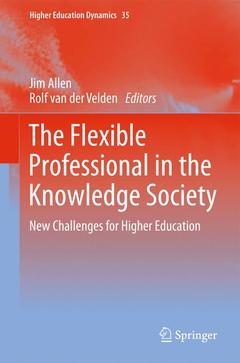Acknowledgements.- Editors.- Contributors.- Management summary.- 1. Introduction; Jim Allen and Rolf van der Velden_ 1.1 The policy context_ 1.2 The REFLEX project_ 1.3 Trends and demands_ 1.4 Methods and data_ 1.5 Structure of the report_ References_ Appendix 1.1 First and second level programmes per country.– 2. The Flexible Professional in the Knowledge Society; Rolf van der Velden and Jim Allen_ 2.1 Introduction_ 2.2 The demands from the world of work_ 2.3 On the role of higher education in preparing graduates for the labour market_ 2.4 The effects of programme characteristics on competences_ 2.5 Does higher education provide a good basis to enter the labour market?_ 2.6 Conclusions_References.- 3. The Professional Work of Graduates; Harald Schomburg_ 3.1 What makes a profession?_ 3.2 Who is working as a “professional”?_ 3.3 The role of professional knowledge_ 3.4 Professional role and professional identity_ 3.5 Professions and power_ 3.6 Discussion of results_ References_ Appendix 3.1 Mapping of 3-digit ISCO occupational codes to typology of professions.- 4. “Being Flexible”: Graduates Facing Changes in Their Work Environment; Julien Calmand, Michela Frontini and Michele Rostan_ 4.1 The changing work environment of European graduates_ 4.2 Outline of the chapter_ 4.3 Changes in graduates’ work and employment situation_ 4.4 Employment mobility in graduates’ early career_ 4.5 The impact of employment mobility on graduates’ competences_ 4.6 Employment mobility as a way to get a good job_ 4.7 Graduates facing temporary work_ 4.8 Functional flexibility in graduate employment and work_ 4.9 Functional flexibility, competences, and higher education_ 4.10 Conclusions: two different ways of being flexible_ References.- 5. The Graduates in the Knowledge and Innovation Society; Jean-Jacques Paul_ 5.1 Introduction_ 5.2 Some conceptual elements about innovation_ 5.3 What organisations are likely to be more innovative?_ 5.4 The place and the role of graduates regarding innovation_ 5.5 Are graduates equipped for innovation?_ 5.6 Innovation, occupations and rewards_ 5.7 Conclusions_References_Appendix 5.1 To what extent innovative activities are related to a specific working environment?.- 6. Mobilization of Human Resources; Jim Allen_ 6.1 Clarifying concepts_ 6.2 Mobilization of human resources during higher education_ 6.3 Higher education as producer of “mobilization” competences_ 6.4 Mobilization of human resources after higher education_ 6.5 Determinants of utilization of own capacities_ 6.6 Determinants of mobilization of others’ capacities_ 6.7 Conclusions_References.- 7. International Dimensions of Higher Education and Graduate Employment; Ulrich Teichler_ 7.1 The growing relevance of international dimensions_ 7.2 International mobility_ 7.3 The impact of international mobility on employment and work_ 7.4 Foreign language proficiency_ 7.5 Internationally mobile careers compared to home careers_ 7.6 Concluding observations_ References.- 8. Winners and Losers; Liv Anne Støren and Clara Åse Arnesen_ 8.1 Introduction_ 8.2 Labour market situation – match or mismatch_ 8.3 Wages_ 8.4 Work orientations_ 8.5 Job satisfaction_8.6 Summary and conclusions_ References_ Appendix 8.1 Definition of mismatch_ Appendix 8.2 The effect on wages of gender, grades, level of education, field of study, mismatch and type of job contract_ Appendix 8.3 Definition of winners and losers according to the graduates’ response to the questions on work values and job characteristics (realization of work values).- 9. Conclusions and policy implications; Rolf van der Velden and Jim Allen_ 9.1 General conclusions_ 9.2 Policy implications.- Index.





